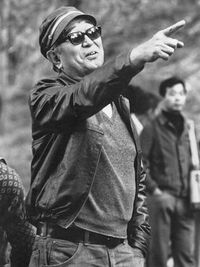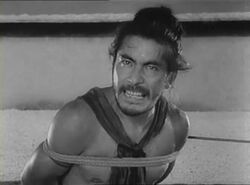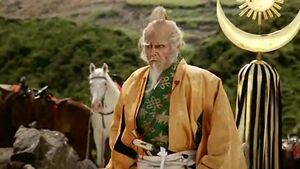Akira Kurosawa
Akira Kurosawa (黒沢 明; March 23, 1910 – September 6, 1998) was a Japanese filmmaker best known for his many samurai films and period pieces. Kurosawa was one of the most important and influential filmmakers in history, and influenced directors like George Lucas, Francis Ford Coppola, Steven Spielberg, Sergio Leone, and Quentin Tarantino.
At one point, Kurosawa was considered one of the greatest directors of all-time. However, this former consensus pegging Kurosawa as one of the greatest—if not the greatest—filmmaker of all-time has recently changed. The work and studies of a new generation of film scholars—most notably Timmy Brenton (age 14) and Stacy Summers (age 19)—has brought to light a number of flaws inherent in all Kurosawa films. For instance, Timmy Brenton observes that Kurosawa's films are completely devoid of “special effects, explosions, gore, or hot girls,” and instead focus on boring things like “the plot” and character development. Stacy Summers—in regards to the social commentary the pervades many Kurosawa films—has made the observation that such things are “boring” and that she'd “rather just watch The Hills.”
Early life
Kurosawa was born in a small suburb of Tokyo in 1910. Film scholar Stacy Summers credits Kurosawa's upbringing with his films' many flaws, as Kurosawa “probably, like, didn’t get MTV.” As a result, Kurosawa—instead of watching reruns of Next or the same seven insipid rap music videos again and again and again—did other things with his time.
Kurosawa had an interest and talent in drawing at an early age, and developed into quite an accomplished painter. This likely led to the director's meticulous shot composition—for which he would later become renowned—though he regrettably focused on this aspect of directing, rather than things like CGI effects or gratuitous explosions.
Kurosawa was also an avid reader, and was influenced from things ranging from American detective fiction to the works of Dostoyevsky. Summers, in regards to Kurosawa's literary influence, observes: “It's no wonder he liked to read so much; all his movies have those little words at the bottom!”
Career and criticism
Kurosawa directed over thirty films in a career that spanned a half century. The notable flaws of most of his films—the fact that they were often shot in black-and-white, their reliance on boring things like “plot” to advance the plot, their excessive use of “weird Japanese shit” (Brenton), and the funny little words on the bottom of the screen that tell you what the people in the movie say—have been meticulously analyzed and cataloged by most contemporary film scholars.
Some of Kurosawa's most well known films—namely Rashomon, Samurai, Yojimbo, and Ran—have been particularly scrutinized. Due largely to the work of Timmy Brent, Stacy Summers, and other like film scholars, any prior notion of “greatness” these films might have had has been totally refuted.
Rashomon
Rashomon (羅生門) was Kurosawa's first major international success, and can be credited with essentially making the director's career.
The film itself chronicles four completely different accounts of a rape-murder that occurs in a secluded grove, and uses the struggles of a group of men (situated in the ruins of the titular Rashomon temple) to piece it all together as a framing device. The film touches on subjects like the objectivity of reality versus the subjectivity of human perception, the selfish nature of Man, class difference and the strife it creates, and other boring ass shit like that.
Brenton comments that the film is “so effing boring!” and that the film's most prominent sword fight is “really lame.” Furthermore, he opines that bandit (played by Kurosawa regular Toshiro Mifune) would have been way cooler if he were played by Will Smith.
As is typical of Brenton, he dismisses the film's black-and-white photography as “stupid,” and on the subject of Kurosawa's symbolic use of light, says: “wait, what are you even talking about?” Brenton goes on to ask “what the hell's a symbol?” before finally concluding “no, seriously, I don't know what you're even talking about.”
Seven Samurai
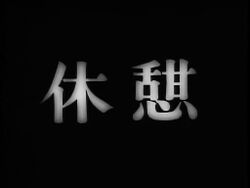
Seven Samurai (七人の侍) is without a doubt Kurosawa's most well known and popular film. It has been cited as an influence by most notable New Hollywood directors, including Steven Spielberg and George Lucas, and is credited with inventing the action movie genre. The film won Kurosawa long lasting international acclaim, and was until recently considered to be the greatest film of all time in some circles.
The movie begins with a village about to be plundered by bandits. Rather than submit to the bandits, however, the villagers resolve to fight, and enlist the help of seven masterless samurai, who agree to defend the village for little more than daily rations of rice. What follows is a three-plus hour epic that sheds light on things like class divides, inequity, sacrifice, teamwork, leadership, and survivalism; all the while establishing almost single-handedly all the conventions and archetypes that would become staples of almost every action movie to follow: the “reluctant hero” and “comic relief” characters, the “young love” subplot, the use of weather conditions to heighten the mood of a scene, even the use of slow-motion to increase the impact of action scenes. Keeping all these things in mind, Seven Samurai is without a doubt one of the most boring movies ever made.
Brenton rhetorically asks (an example of his sophisticated, biting wit): “if this is an action movie, where are all the explosions?” He continues: “what kind of action movie doesn't have explosions? This is soooo lame.”
Summers—in regard to the seemingly needless emphasis Seven Samurai places on samurai-villager interaction—observes: “why is that, like, half the movie? I mean, it's not like any of that is, like, important or meaningful or anything, unless, like, I'm missing something or something.”
Following this comment, Summers went on to go clubbing later that night and make out with some black dude she didn't know, in typical scholarly fashion.
Yojimbo
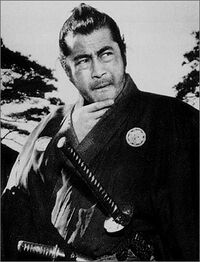
Yojimbo (用心棒) consistently ranks among Kurosawa's most well-known and influential films, and was often called the “definitive samurai movie.” It has influenced everything from Sergio Leone's 1964 film A Fistful of Dollars to the Bruce Willis suckfest Last Man Standing, as well as dozens of films in between.
Yojimbo's once-perceived classic status had much to do with the eloquence of its narrative. A wandering samurai (played by Toshiro Mifune) comes upon a town controlled completely by two feuding gangs. The ronin—who simply calls himself “Sanjuro” (roughly translated: “Thirty-something”)—makes a very public display of his fighting prowess, and eventually pits the two gangs against each other before cleaning up town once and for all. Other aspects of note include the innovative score by Masaru Sato.
Brenton takes an unusually (even for him) strong stance on the film, singling out its fight scenes in particular. “There's not even any blood!” he laments, “what the fuck!?” Brenton goes on to dismiss other aspects of the film's swordplay—the expert direction, precise choreography, and actual relevance to the fucking plot—as being unimportant because ultimately “there isn't any blood!” According to Brenton:
| “ | Any good fighting movie should have tons of blood because blood is really cool. I like it when there's just like waves of it, and it shoots out all like pssssssssshhhh! cuz it's really cool and awesome and stuff! That's why I like playing [the videogame] God of War, because, like even though it's me brutally killing the same six enemies again and again and again and again for no real reason, it has tons and tons of blood! Also, it has boobs! I like boobs! | ” |
Ran
Kurosawa himself considered Ran (乱) to be his magnum opus. A transposition of Shakespeare's play King Lear, Ran chronicles the violence, chaos and betrayal that ensue after an elderly lord abdicates to his three sons.
Though the film shares the same basic premise with its Shakespearean counterpart, Ran surpasses its source material in both ambition and scope, serving as a comment on Japanese history, Kurosawa's own career, and the state of world affairs in general. Needless to say, this film sucks balls.
Though the film is mercifully not shot in Kurosawa’s typical black-and-white manner, the film’s color only serves to highlight the ridiculousness of the characters' bizarre Japanese costumes. Brenton speaks the general consensus when he says the film reeks of “weird Japanese shit,” and that the film's meticulously created costumes—many of which Kurosawa painstakingly designed himself—are “totally retarded.”
Furthermore, the Ran's intricate plot is “confusing” because all Japanese people “look the same,” according to both Brenton and Summers.
Conclusion
As you can plainly see, Kurosawa's former standing as one of the all-time great filmmakers was ill-founded. The ever-brilliant Stacy Summers sums it up best in her book Kurosawa's Lame, when she says:
| “ | In summation, Akira Kurosawa's, like, really lame. His movies are boring because, like, there's no cool action scenes and no Will Smith. Furthermore, they're all, like, in black-and-white, and really confusing, and weird and Japanese and stuff. Finally, they have those weird words at the bottom of the screen. I hate reading! If I wanted to read, I wouldn't watch a movie, I'd read a book! Except that I don't actually read books either. That doesn't make me a vacuous fuckhead. | ” |
See also
| Featured version: 14 June 2009 | |
| This article has been featured on the main page. — You can vote for or nominate your favourite articles at Uncyclopedia:VFH. | |
